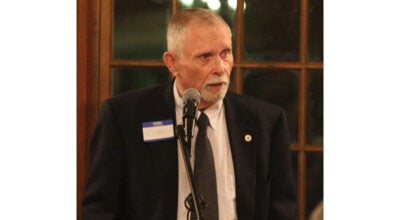How to begin again
Published 11:25 am Saturday, September 6, 2014
I know three different kinds of people when it comes to New Year’s Resolutions. First, there are people who stay away from making resolutions all together. They may think the idea is silly, they may not be aware of the ways that they want to change themselves, or they may have failed at enough New Year’s Resolutions that they have resolved not to make resolutions. The second kind of people are those who make resolutions out of wishful thinking that something will change on its own, but do not really make a plan for living out these resolutions — and as a result their resolutions rarely lead to any actual change. Then there is the third group.
The third group is made up of people who spend weeks or even months looking at their lives and making decisions about what they want to change. They develop their New Year’s Resolutions carefully with a plan in mind for how they are going to achieve it. They set goals for the new year that are both measurable and time-bound (a good goal has to be both measurable and time-bound, so you can know if you are achieving it — something like, “I am going to run 5k (3.1 miles) in under 25 minutes before May 1” or “I am going to read the entire Bible this year.”) Then they come up with a structured plan for meeting those goals. These are the people who are still in the gyms when January is over. They are also, unsurprisingly, among a small percentage of those who make New Year’s Resolutions who actually keep them.
In about three months, many of us are going to be talking about New Year’s Resolutions and beginning 2015 with high hopes for change. Unfortunately, most of us will probably not follow through on our resolutions. There are a number of reasons we struggle with achieving our goals. The first is that we do not set measurable, time-bound goals to help us see how we are doing. The difference between, “I am going to be a nicer person this year,” and “I am going to offer at least one genuine compliment every day” is that the second goal is one we can truly measure and truly achieve. The second reason we fail to achieve our goals is that too often we are setting the goals we are “supposed” to set rather than the ones we truly desire to achieve.
For me, this is the difference between setting a goal for running (a popular “Resolution” that I am not especially fond of and one I don’t really want to achieve) instead of a goal for something like canoeing (that I love, would like to do more, and would be good for my body to do).
The final reason we struggle with our resolutions is that our timing is bad. The idea of a “New Year’s Resolution sounds good, but the reality is that the “New Year” actually comes in the middle of the yearly cycle of life. For most of us, the true beginning of a new year comes in the fall when the summer ends and we gear up for another year of work, school, events and life. Even for those who are not directly a part of a school, the school year impacts the rhythm of life in our society so profoundly that the fall is the true beginning of a new year for most of us.
That means right now is the best time to think about New Year’s Resolutions. Now is the best time to look at what you really want to achieve in the next year and set some measurable, time-bound goals. Right now is when you are going to establish the rhythm of life for the year to come, so if you want 2015 to look different than 2014 or 2013, don’t wait until Jan. 1 to change. Do it now.
At Courtland United Methodist Church, we will be starting a new series this Sunday, “How to Begin Again” that recognizes now is the time we are beginning our new year. Our first Sunday will be focusing on “Reset” and we would love to have you join us as we explore how God is calling us to reset, recommit and reengage our lives.
Now is the time to make some resolutions. What are you resolving to do in the coming year?
ANDREW BOOK is the pastor of Courtland United Methodist Church. He can be contacted at 653-2240 or andrew@courtlandumcva.org





